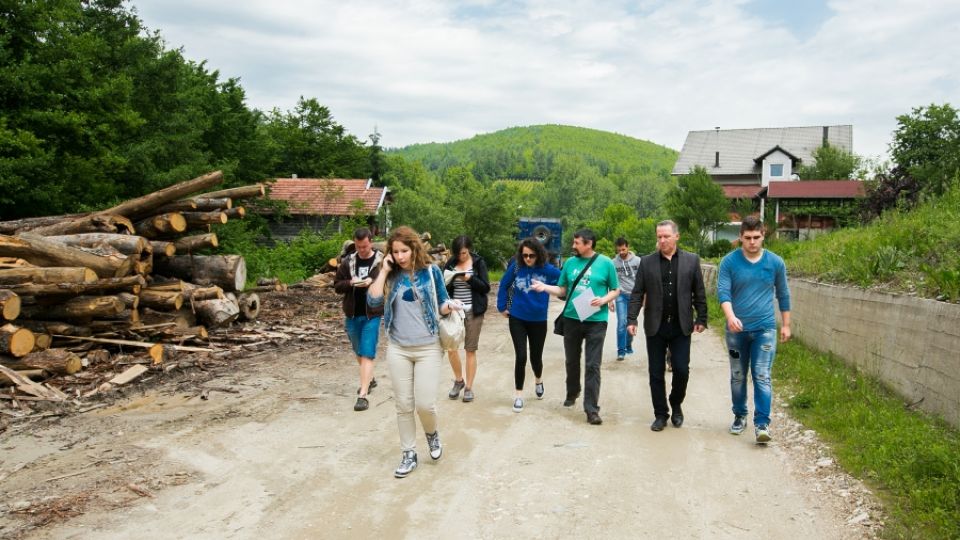Your Excellency, Mrs Sinanoglu, Mr Moore, Mr Wigemark, Mr Mimica,
we would address you because we are very concerned of course and consequences of intervention of the special police unit forces of the Ministry of Interior of Central Bosnian Canton against peaceful protestors in the village of Kruščica near Vitez, which took place on Thursday August 24 around 5 a.m.
Our non-governmental organizations are engaged in protection of environment and enforcement of public participation in decision-making in environmental issues. Currently, we are jointly implementing a project financed by the Czech Transition Cooperation, focused on coordination of the Civic Coalition for the Protection of Rivers of Bosnia and Herzegovina (1). Thus, we are, among other things, in close cooperation with tens of local civic initiatives all around the country, opposing controversial projects of dams and hydropower plants construction.
The residents of Kruščica village have, for the last month been peacefully protesting against Kruščica 1 and Kruščica 2 small hydropower plants, whose construction is to take place on the river of the same name. Although the intended construction obtained all the necessary permits, the citizens believe their opinion was not taken into account and existing environmental concerns were not adequately addressed. They also claim the spatial plan of their municipality was purpose-built changed in favor of the construction, while the interests of the people were not considered. Local environmental NGOs, fishermen association and hiking association submitted comments to the environmental permit for Kruščica 1 in 2008, but these were not taken into account. None of the hydropower plants was a matter of environmental impact assessment (EIA). Locals are concerned that the development would harm the amount and quality of drinking water of communities in the area (the river also supplies Zenica, the city of 75,000 inhabitants). Moreover, the protection of entire area as the Krušcia Nature Park is under consideration nowadays (2).
The local residents believed they exhausted their administrative rights, the state authorities ignored their comments and the decision was taken in contradiction to the interests of local community. Since August 2nd, hundreds of people were peacefully blocking a bridge in Kruščica in order to prevent entry of the machinery to the riverbed, and thus to make it impossible to start the hydropower plant construction. At the same time, the protesters allowed passage of private cars and other traffic not related to intended construction. Early in the morning, on August 24th, the twenty-second day of the protest, police brutally attacked a group of 40 people, mostly women from which one was pregnant, being at the bridge at the moment. The protesters neither provoked nor resisted the police, but were nevertheless forcibly removed in order to allow access over the bridge for construction equipment to pass. During the intervention, police officers insulted the women, referred improper comments with sexual connotations, pulled clothes and traditional head scarves. After the police action, at least 27 women and 2 men had to receive emergency medical services due to injuries they obtained, mostly bruising and contusions. They first looked for a medical help in the nearest hospital of Vitez where they were refused and so had to travel 15 kilometers to the town of Travnik. They asked the medical service for a proof of injuries and were prepared to pay the obligatory fee of 50 BAM. However, the medical service refused to issue the proof of injuries. More than 27 people were detained and interrogated for 7 hours at the police station in Vitez.
The Ministry of Interior of the Central Bosnian Canton, responsible for the police, immediately issued a statement (3) in which it claims it acted based on a previously prepared plan of the police headquarters in Travnik with the approval of the Ministry of Interior of the Central Bosnian Canton to make the road blocked by the citizens accessible. However, it was clear that the real aim of this action was to clear the way for construction and not to enable the flow of road traffic. As mentioned above, the protestors did not block the road to the private cars, trucks of forestry company and all other which are not connected to the investor, and other traffic. Moreover, workers and machinery of the Higracon Pvt. Ltd. Sarajevo investing company were immediately behind the police lines and were able to cross the bridge to the location where the hydropower plant is planned as soon as the people had been „removed”. Such a situation leads to the suspicion that the state armed forces could have been misused to enforce private interests instead of protecting public order. The Ministry denies all the allegations regarding the baseless violence and insisted that there were no injured people during the whole intervention, although videos shot by participants of the blockade, their testimony and medical service protocols prove otherwise.
* * * * *
We are convinced that there was not a legal reason for using the force from the side of police against nonviolent protesters. The state authorities were well aware that residents of the village are demonstrating at the river bank for whole month, so there was a lot of time for negotiations and attempts to resolve the conflict in a non-violent way.
Based on the allegations reported by the mass-media based on the evidence given by the eyewitnesses, the Institution of the Human Rights Ombudsman of Bosnia and Herzegovina opened an ex officio investigation in order to examine all the circumstances of this case. In this respect, the Ombudsman will also review the procedure for obtaining permits for mini-hydropower plants from the point of view of environmental protection and the interest of the local population (4). There is a suspicion that the police action might violate the Law on Police Officers of Central Bosnian Canton (5).
Local residents decided not to give up, and their protest against devastation of Kruščica river continues. Since the intervention, around a hundred people have been day and night demonstrating at the construction site. We are afraid that the use of force from the side of the state authorities might occur again, but the violence can lead only to escalation of the tensions, not to a solution of the issues.
We would like to kindly ask you to watch described case of violence closely and help you to enforce the principles embedded in international convention ratified by Bosnia and Herzegovina, particularly the European Convention on Human Rights (6) and the Aarhus Convention (7), in your negotiations with state authorities, to ensure larger public access to the information, the widest possible involvement of the citizens in decision-making processes, and emphasize the open dialog of different stakeholders rather than violent enforcement of particular interests. Applying these principles would prevent similar conflicts in the future.
Sincerely yours, on behalf of
Center for Environment, on behalf of Coalition to Protect Bosnia-Herzegovina’s Rivers
Viktor Bjelic
vice-president
Center for Environment, BiH
Arnika – Citizens Support Centre
Martin Skalsky
executive director
Arnika - Citizens Support Centre, CZ
Attachments:
1/ Details on “Save the Rivers” campaign: http://english.arnika.org/news/the-coalition-for-river-protection-in-bosnia-and-herzegovina-is-starting-the-campaign-against-hydropower-plants
2/ Details on Kruscica case: https://www.arnika.org/en/hotspots/bosnia/kruscica
3/ Press release of Ministry of Interior of the Central Bosnian Canton: https://www.mupsbk-ksb.gov.ba/index.php/informacija/1099-deblokada-javnog-puta-u-kruscici
4/ Press statement of The Institution of Human Rights Ombudsman of Bosnia and Herzegovina: http://www.ombudsmen.gov.ba/Novost.aspx?newsid=779&lang=EN
5/ Law on Police Officers of Central Bosnian Canton (excerpts, non-official translation)
Article 27 (Conditions for the Use of Force)
(1) A police officer may use force only when absolutely necessary and only to the extent necessary to achieve a legitimate aim.
(2) Unless otherwise provided by this law, means of coercion, such as physical force, including martial arts, rods, binding agents, devices for the forcible arrest of persons or vehicles, chemical agents, firearms, official dogs, water cannons, special vehicles, special types of weapons and explosive devices, can be used when necessary to protect human lives, refuse attacks, overcome resistance, and prevent escape.
(3) Before using any means of coercion, a police officer will give a warning, unless this could jeopardize the security of a police officer or other person or would be manifestly inappropriate or meaningless in the circumstances.
(4) Detailed regulations on the use of force shall be made by the minister at the proposal of the police commissioner.
Article 28 (Exemption from the use of certain means of coercion)
(1) Physical force and rods are not used for children, the elderly and disabled persons, including those who are seriously ill, or towards women who are obviously pregnant, unless these persons directly endanger the life of a police officer, his life or the life of other people.
(2) Firearms and special weapons cannot be used only for the purpose of preventing escape of persons, unless it is the only means of defense against direct attack or danger.
(3) Explosive devices cannot be used to prevent escape of a person.
6/ European Convention on Human Rights
Article 11
1. Everyone has the right to freedom of peaceful assembly and to freedom of association with others, including the right to form and to join trade unions for the protection of his interests.
2. No restrictions shall be placed on the exercise of these rights other than such as are prescribed by law and are necessary in a democratic society in the interests of national security or public safety, for the prevention of disorder or crime, for the protection of health or morals or for the protection of the rights and freedoms of others. This Article shall not prevent the imposition of lawful restrictions on the exercise of these rights by members of the armed forces, of the police or of the administration of the State.
7/ The Convention on Access to Information, Public Participation in Decision-Making and Access to Justice in Environmental Matters (Aarhus Convention) reads in its the Article 3 (8) that “[e]ach Party shall ensure that persons exercising their rights in conformity with the provisions of this Convention shall not be penalized, persecuted or harassed in any way for their involvement.” Article 4 reads “Each Party shall ensure that, public authorities, in response to a request for environmental information, make such information available to the public.” Article 7 reads that “2. The public concerned shall be informed, either by public notice or individually as appropriate, early in an environmental decision-making procedure, and in an adequate, timely and effective manner. The public participation procedures shall include reasonable time-frames for the different phases, allowing sufficient time for informing the public in accordance with paragraph 2 above and for the public to prepare and participate effectively during the environmental decision-making.”
ADDRESSEES:
Her Excellency, Mrs Sezin Sinanoglu
UN Resident Coordinator in Bosnia and Herzegovina
United Nations in Bosnia and Herzegovina
Zmaja od Bosne
71000 Sarajevo
Bosnia and Herzegovina
His Excellency, Mr Jonathan Moore
Ambassador
OSCE Mission to Bosnia and Herzegovina
Fra Anđela Zvizdovića 1, UNITIC Tower A
71000 Sarajevo
Bosnia and Herzegovina
His Excellency, Mr Lars-Gunnar Wigemark
Head of EU Delegation to BiH and EU Special Representative in BiH
Delegation of the European Union to Bosnia and Herzegovina
Skenderija 3a
71000 Sarajevo
Bosnia and Herzegovina
CC: European Commission
His Excellency, Commissioner, Mr Neven Mimica
Directorate-General for International cooperation and Development
Human Development and Migration
B-1049 Brussels
Belgium







